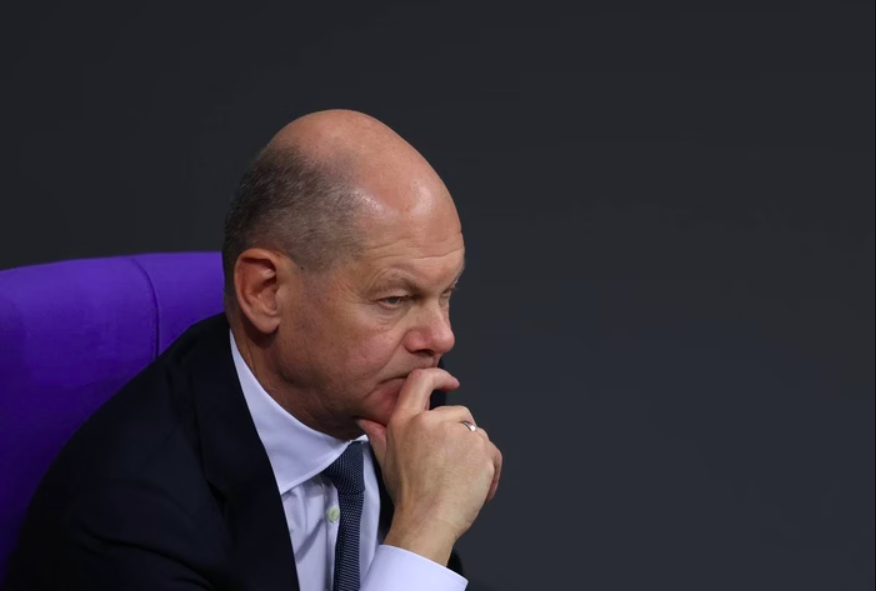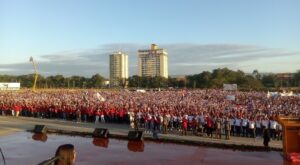
Published 16/12/2024 17:20 | Edited 12/16/2024 17:22
German Chancellor Olaf Scholz faced a decisive blow to his government this Monday (16) when he lost the vote of confidence in the Bundestag, the German Parliament. The defeat, expected after weeks of political crisis, resulted in the approval of a motion that consolidates the collapse of his government coalition.
Of the 736 parliamentarians, 394 voted to dissolve the government, 207 were against it and 116 chose to abstain. The result paves the way for the dissolution of the current legislature and the calling of early federal elections, scheduled for February 23, 2025, marking the end of the brief Scholz era, which lasted just over three years. It is now up to German President Frank-Walter Steinmeier to decide whether to dissolve Parliament, paving the way for early general elections.
Scholz, who came to power in 2021 as leader of an unprecedented “traffic light” coalition between Social Democrats (SPD), Greens and Liberals (FDP), lost the support of the FDP in November, becoming head of a minority government.
The political crisis that brought Scholz down
The crisis began in November, when Scholz fired the Finance Minister, a member of the Liberal Party (FDP), due to differences over the conduct of economic policy. The decision caused the departure of the remaining liberal ministers from the cabinet, dismantling the fragile tripartite coalition formed by Social Democrats (SPD), Greens and Liberals.
Without a parliamentary majority, Scholz lost the ability to govern amid a challenging domestic and international scenario. “We need a government capable of acting and making the necessary decisions for our country”, argued Scholz, justifying the dismissal that triggered the crisis.
This will be only the fourth time in 75 years that Germany, the European Union’s largest economy, has held early elections. The last such vote took place in 2005, when then-Chancellor Gerhard Schröder also lost a vote of confidence, resulting in the election that brought Angela Merkel to power.
The collapse of the Scholz government comes at a delicate time for Europe. Germany faces growing tensions with Russia over the war in Ukraine, as well as domestic pressures over energy, the economy and the ecological transition. The German crisis reflects political instability that is already affecting other countries in the bloc, such as France, where the government is facing popular discontent.
Electoral scenario: new leaders and challenges
Electoral polls point to an advantage for the Union (CDU/CSU), a center-right bloc led by Friedrich Merz. Scholz’s party, the Social Democrats (SPD), is behind, followed by the Greens, whose leader and current vice-chancellor, Robert Habeck, is also running for chancellor.
However, even if the CDU’s favoritism is confirmed, Merz will have to negotiate alliances to form a coalition government, given the political fragmentation of the Bundestag.
The election should also mark the rise of anti-system political forces, such as the ultra-right Alternative for Germany (AfD), which could double its bench, and the debutant Sahra Wagenknecht Alliance (BSW), a left-wing party. The AfD presented its candidate, Alice Weidel. Despite this, the AfD remains politically isolated, with other parties refusing to form alliances with the group.
The role of President Steinmeier
Steinmeier now has 21 days to decide whether to dissolve the Bundestag and call new elections. If you opt for this measure, the claim must take place within 60 days. Even defeated, Scholz remains in office on an interim basis until a new Parliament is constituted.
Until then, Scholz will remain acting chancellor. The electoral campaign, however, has already begun in earnest, with parties intensifying their efforts to win over voters.
The crisis highlights the complexity of governing with multi-party coalitions and places Germany in a period of uncertainty. The next government’s ability to form consensus will be crucial to the country’s stability and its position as a leader in Europe.
With negotiations for new alliances underway, Germany is heading towards an election year marked by fierce disputes, as it tries to reconcile internal challenges and its strategic role on the global stage.
Voting disputes and speeches
The Bundestag session turned into a stage for accusations between party leaders. Scholz criticized his former ally, Christian Lindner, leader of the FDP and former finance minister, accusing him of “political sabotage”. Lindner countered by saying that Scholz demonstrated “an inability to lead crucial changes.”
Friedrich Merz, leader of the CDU, attacked Scholz for his management of the economic crisis and his stance towards the European Union. Robert Habeck, vice-chancellor and leader of the Greens, defended the Scholz government, attributing the economic difficulties to the legacy left by Angela Merkel.
AfD leader Alice Weidel criticized both Scholz and Merz, accusing them of incompetence in managing the economy and the migration crisis. Sahra Wagenknecht, founder of BSW, reinforced the narrative of decline, describing the Scholz government as “three years of regression”.
The political crisis and the call for elections come at a delicate time for Germany, which is facing high inflation, an economic slowdown and energy challenges related to the war in Ukraine. The results of the polls in February will not only define the next chancellor, but also the direction of Europe’s largest economy amid a scenario of regional and global instability.
Source: vermelho.org.br

